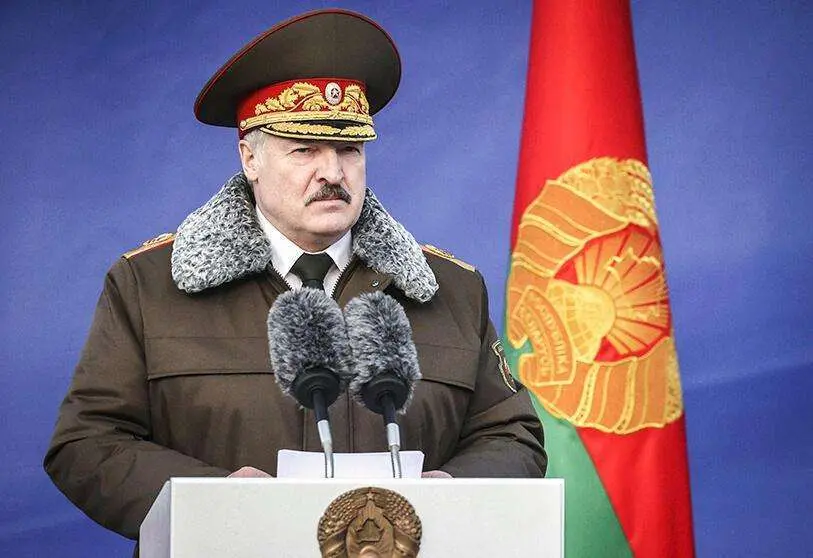The strange case of Mr. Lukashenko

It is difficult to gauge the situation in Belarus by analysing it solely in terms of power relations. Without adding Alexander Lukashenko's character to the equation, events in the former Soviet republic seem erratic and almost puerile. It is not uncommon in history to find tyrants of all stripes who have established a regime based on their own personality, and Lukashenko is no exception. After his, more than expected, written election victory in the August 2020 presidential elections, Lukashenko gave an extemporaneous speech at a women's seminar the following month, during which he announced with flowery verbiage the closure of borders in response to public protests against the new election rigging.
Like any self-respecting dictator, Lukashenko maintains that the Belarusian nation and he are one, and therefore Lukashenko's enemies are the enemies of the motherland. And like all autocrats, Lukashenko has developed paranoid traits that make him see even more enemies than he has, having even insinuated on the night before the elections that the Kremlin had sent agents provocateurs to Minsk on a mission to instigate a massacre to harm him. After the elections, he extended his suspicions to Poland, which he accuses of wanting to annex the border region of Grodno, where, according to people close to Lukashenko, an enchanted being from the forest predicted that he would meet Salvador Allende's fate in the Moneda Palace. Perhaps because of this, he has appeared several times on television brandishing a Kalashnikov, assuring that there will be no new elections unless his enemies kill him first.
Lithuania is not spared from Lukashenko's tirades either, after the Baltic country granted asylum to Svetlana Tichanovskaya, the presidential candidate leading the protests against the dictator, whom he accuses of being a fifth columnist for the European Union, in whom Lukashenko sees a bureaucratic reincarnation of the Third Reich, allowing him to spin a rhetoric truffled with reminiscences of the Great Patriotic War against Nazism. This narrative fits like a glove with Putin's manoeuvres for a soft annexation of Belarus as part of Moscow's plans to create a security buffer zone between Russia and NATO countries.
Belarus is already to all intents and purposes a client state of Moscow, which monitors the Belarusian economy by turning the tap of subsidised oil on and off, and restricts or allows Belarusian agri-food imports based on Lukashenko's greater or lesser followership.
Beyond remote control of the economy, Moscow has deployed Russian operatives in Minsk who are experts in asymmetric warfare, cyber intrusion operations, propaganda and disinformation techniques, and security advisors, who are preparing the conditions for integrating Belarus into the Russian Federation. Manipulation of Lukashenko's bizarre character is central to this Kremlin strategy, with the Kremlin's security service coordinating the Belarusian leader's actions to neutralise the protest movement through a combination of systematic repression and targeted threats against opposition leaders, including the loss of custody of their children and, as we have seen, air piracy.
This mix of personal intimidation and information poisoning follows the well-worn KGB playbook, sowing discord among opposition members to create regional, religious, and class divisions, which unravels the Belarusian social fabric and allows Russia to gradually take control of the country's institutions.
It is foreseeable that once this preliminary phase is completed, Lukashenko will initiate formal contacts with representatives of an already tamed civil society, as a prelude to implementing the constitutional changes that Moscow needs to carry out in order to change everything without changing anything, as Putin has done at home, carrying out an apparent opening, likely to include a nominal ceding of power to parliament, under which de facto control of Kremlin-friendly political parties will be hidden, in the style of the pro-Russian parties in Crimea and Ossetia. It is highly unlikely that sanctions imposed by the EU and others will alter this roadmap, given that this reaction was written off in Russian plans, and extremely unlikely that the EU will go much further. Lukashenko will therefore continue to play his role as envisaged by Putin. But far from showing discomfort at this situation, Lukashenko's personality leads him to willingly play the role of a supporting character who has found in Putin his author, thanks to which all the spotlight is on him in one of the rings of the great Russian circus.

